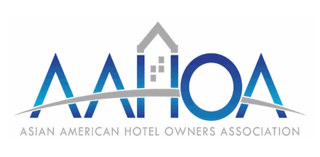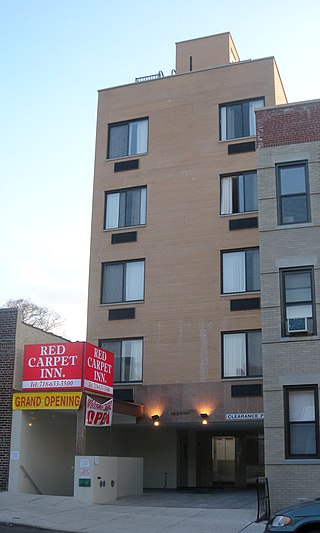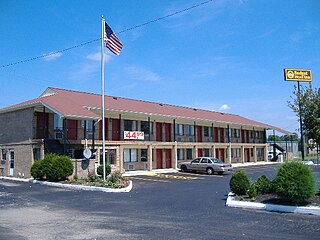
A motel, also known as a motor hotel, motor inn or motor lodge, is a hotel designed for motorists, usually having each room entered directly from the parking area for motor vehicles rather than through a central lobby. Entering dictionaries after World War II, the word motel, coined as a portmanteau of "motor hotel", originates from the Milestone Mo-Tel of San Luis Obispo, California, which was built in 1925. The term referred to a type of hotel consisting of a single building of connected rooms whose doors faced a parking lot and in some circumstances, a common area or a series of small cabins with common parking. Motels are often individually owned, though motel chains do exist.

Days Inn is a hotel chain headquartered in the United States. It was founded in 1970 by Cecil B. Day, who opened the first location in Tybee Island, Georgia. The brand is now a part of the Wyndham Hotels and Resorts, headquartered in Parsippany, New Jersey, which used to be a part of Cendant. As of December 31, 2018, Days Inn includes 1,728 locations worldwide with 137,678 rooms.

Choice Hotels International, Inc. is an American multinational hospitality company based in North Bethesda, Maryland. The company, which is one of the largest hotel chains in the world, owns several hotel brands ranging from upscale to economy. As of the third quarter 2023, Choice Hotels franchised nearly 7,500 hotels, representing nearly 630,000 rooms, in 46 countries and territories.

The hospitality industry is a broad category of fields within the service industry that includes lodging, food and beverage services, event planning, theme parks, travel agency, tourism, hotels, restaurants and bars.
Travelodge refers to several hotel chains around the world. Current operations include: the United States, Canada, the United Kingdom, Spain, Ireland, New Zealand, Australia and several countries in Asia. As of December 31, 2018, it has 435 properties with 31,005 rooms.
Wyndham Hotels & Resorts, Inc. is an American hotel company based in Parsippany, New Jersey, United States. It describes itself as the largest hotel franchisor in the world, with 9,280 locations. It has a portfolio of 20 hotel brands, including Baymont, Days Inn, Howard Johnson, La Quinta, Ramada, Super 8, Travelodge, and Wyndham.

Knights Inn is an American full-limited service hotel chain owned by Red Lion Hotels Corporation and based in Denver, Colorado. Knights Inn used to be built with all-exterior corridors and medieval-inspired architecture, but the chain now has updated options for all Knights Inn properties.

Rodeway Inn is a chain of economy-priced hotels in the United States and Canada. Founded by Michael Robinson in 1962, the franchise is now led by Choice Hotels corporation.
A hotel manager, hotelier, or lodging manager is a person who manages the operation of a hotel, motel, resort, or other lodging-related establishment. Management of a hotel operation includes, but is not limited to management of hotel staff, business management, upkeep and sanitary standards of hotel facilities, guest satisfaction and customer service, marketing management, sales management, revenue management, financial accounting, purchasing, and other functions. The title "hotel manager" or "hotelier" often refers to the hotel's general manager who serves as a hotel's head executive, though their duties and responsibilities vary depending on the hotel's size, purpose, and expectations from ownership. The hotel's general manager is often supported by subordinate department managers that are responsible for individual departments and key functions of the hotel operations.
Vantage Hospitality Group Inc. was an American hotel corporation, operating hotels in the United States and internationally. Its brands include Best Value Inn and Lexington by Vantage. In 2016, Vantage Hospitality Group was acquired by Red Lion Hotels Corp.
A referral hotel chain is a type of hotel franchise. It is a type of hotel that operates independently but maintains affiliation with a given chain. To stay within the chain, the hotel must meet certain minimum criteria.

The Asian American Hotel Owners Association (AAHOA) is a trade association that represents hotel owners. As of 2022, AAHOA has approximately 20,000 members who own about 60% of the hotels in the United States. AAHOA provides service and support for hoteliers through its educational offerings, policy and political advocacy for the interests of hotel owners, opportunities for professional development, and community engagement.

HVS is a consulting firm that specializes in providing services to the hospitality industry. As of 2020, HVS operated out of 47 offices located in North America, Europe, Asia, Africa and the Middle East. HVS offers expertise across all types of hospitality assets, including hotels, restaurants, casinos, shared-ownership lodging, mixed-use developments, golf courses, and spa and wellness, as well as conventions, sports, and entertainment facilities. In addition to market studies, feasibility studies, and appraisals, HVS provides multiple hospitality services and specializations in areas such as executive recruitment, brokerage, hotel management, asset management, operational consulting, litigation support, court-appointed receivership services, hospitality interior design, tax advisory, and hotel brand and management selection.

Red Carpet Inn is a chain of hotels and motels, with locations in the United States and Bahamas. Red Carpet Inn Brands are part of the Hospitality International system and are individually owned and operated.

Scottish Inns is a motel chain in the United States. It is a brand of Hospitality International.
A resort fee, also called a facility fee, a destination fee, an amenity fee, an urban fee, or a resort charge, or a hidden hotel booking fee is an additional fee that a guest is charged by an accommodation provider, usually calculated on a per day basis, in addition to a base room rate.
Merile Key (M.K.) Guertin was the founder of Best Western and was known in the hospitality industry as Mr. Motel.

Budget Host is an American lodging chain. It was founded in 1975 in Fort Worth, Texas by Ray Sawyer and Ed Semmler.

Hospitality International is a chain of hotels and motels in the United States and Canada. Their brands include Red Carpet Inn and Scottish Inns.












